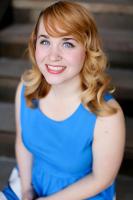For this edition of Listen Local we welcome Alyssa Murray, songwriter, vocalist and keyboardist for the Kansas City jazz group The AM Trio, which also includes bassist Joel Stratton and drummer Joshua Blythe. Their brand-new debut album, As of Now, showcases Murray's songwriting talent. An instructor for The Music School and an accompanist for the Kansas City Ballet, Murray is also an established freelance performer in her own right, holding a Bachelor of Music degree in Jazz Studies from the University of Missouri-Kansas City. Please enjoy this interview with Murray about her craft, what her current inspirations are, and her book, music and movie recommendations.
*
Please introduce yourself. Where do you live and work? What does a typical day look like for you?
I’m a pianist, vocalist and songwriter currently residing in midtown Kansas City, MO. A typical day for me usually involves a combination of playing, teaching and writing music. My mornings are used for listening, practicing and covering business things while in the afternoon and evening I’m either out performing or teaching at Music House School of Music. I also accompany KC Ballet’s R.O.A.D. program in multiple elementary schools throughout the week and help teach Unity’s Youth Meditation on Sundays.
Delve a little into your own process of songwriting. What may surprise a listener of your music about how you create it? What tools do you use?
Within my own process of songwriting, I start with the music side of things. Brainstorming for ideas involves a lot playing around, trying things out and following my ear/intuition. If I find myself staring at a “blank slate” for too long, I try to come up with ideas by checking out a chord progression or melody that sticks out to me. Then I see if I can vary or connect it to another concrete idea I have. After I’ve established a general song form or at least a section to work I begin to work on lyrics. If I feel stuck or unmotivated lyrically, I like to study other writer’s songs or read a short story to stimulate my imagination. I try to keep ideas on reserve, both musically and lyrically, so when it’s time to write the first step isn’t so intimidating. Discovering these initial ideas tends to be the most tedious part of the process. Nothing I usually write comes in a clean, step-wise order. For example, my last couple of songs were written in sections. Sometimes I find my first, initial idea might work better as an ending or vice versa. Trying to figure out how the puzzle is all pieced together is my favorite part of the songwriting process. I think it's because at that point the song has established some form yet it has many directions in which it can go!
Your website states that your original work aims to "combine jazz with the narrative elements of contemporary folk." Talk more about you connect these the two musical traditions in your work.
Rhythmically and harmonically, I’m heavily influenced by the jazz tradition. It’s evident in my choice of chords, groove and how my trio interacts with one another. I leave a lot of the interpretation of the feel up to the drummer and bassist within my trio. This showcases each player’s personality and allows for more individual, creative input. When it comes to lyrics, much of my influence comes from contemporary folk artists like Joni Mitchell, Tom Waits and Rufus Wainwright. Subject matter, imagery and narrative are all things these artists explore and are masters at. Harmonically and rhythmically folk music is usually simpler than jazz and lyrics are what seem to be emphasized. To me combining these two traditions seems natural for they balance out each other. Jazz is sophisticated harmonically and rhythmically while contemporary folk is rich in lyric and narrative.
What was your experience recording your first EP, As of Now? What did you learn that you'll bring to future recording projects?
My experience recording “As of Now” was great! Our trio had been playing most of these songs for over a year and had performed them in wide array of places. It was definitely time to record! Before heading to the studio, I thought about the larger picture and what I wanted to communicate with this particular group of songs. I decided to upgrade the arrangements of some of these tunes by adding trumpet, saxophone and guitar parts as well as some vocal harmonies. I didn’t mess around with effects, layering or really any “studio magic”.This album was straight forward in approach and sound. Looking back, I’m starting to better understand the potential of what can be accomplished in a professional recording studio and look forward to utilizing tools such as vocal and instrumental layering, sound effects, synthesizers etc. to achieve a greater depth of sound. Thinking about the post-studio result of songs also creates a different mental space for me to write from too.
Can you point to one time in your life where you knew you wanted to be a composer? Who inspired you early on to create new music and what were your earliest compositions like?
I have some early memories of messing around on pianos and making up songs in my head but it wasn’t until I began guitar lessons at age 12 that my creative spark was lit. I felt an immediate sense that I should be aiming to create something but didn’t know exactly what. I started carrying around notebooks and filling them up with writings, song ideas and a lot of random doodles. Listening and discovering new music became a favorite activity of mine. It wasn’t until I was 16 that I completed my first song but shortly after that I started writing regularly. Luckily, I had a great songwriting mentor that helped guide me in my own writing and introduced me to many great songwriters, authors and poets. Lessons with him created an environment that inspired me to write and cultivate my own ideas. I feel my earlier compositions share the originality of my current songs posses but are less sophisticated harmonically and rhythmically. That shift in my style can be credited to playing and studying jazz the past five years or so. My earlier lyrics were more abstract while now there tends to be more cohesive story lines.
What advice do you have for younger composers?
Some advice I’d give to young composers is to be aware of your strengths and weaknesses. Be honest about what makes you unique and use that to your advantage. Let that aspect empower yourself and your art. Yet, be open minded that there’s much to explore and an infinite number of ways to improve and evolve.
Who or what inspires you now?
I’m digging deeper into the music of Antonio Carlos Jobim and other Brazilian musicians like Baden Powell and Joao Gilberto. I’m also revisiting Kenny Werner’s ‘Effortless Mastery’, a great book discussing the ideal mental space for playing and practicing and how to cultivate that space with meditation.
Alyssa Murray's recommendations from the Johnson County Catalog:
1. Effortless Mastery by Kenny Werner
2. Saxophone Colossus by Sonny Rollins
3. Interpreter of Maladies by Jhumpa Lahiri
4. Rufus Wainwright by Rufus Wainwright
5. The Hissing of Summer Lawns by Joni Mitchell
6. Elis and Tom by Antonio Carlos Jobim


